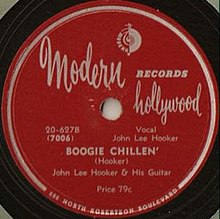Our website is made possible by displaying online advertisements to our visitors.
Please consider supporting us by disabling your ad blocker.
Boogie Chillen'
| "Boogie Chillen'" | |
|---|---|
 | |
| Single by John Lee Hooker | |
| B-side | "Sally May" |
| Released | November 1948[1] |
| Recorded | September 1948[1][a] |
| Studio | United Sound Systems, Detroit, Michigan |
| Genre | Blues |
| Length | 3:11 |
| Label | Modern |
| Songwriter(s) | John Lee Hooker[b] |
| Producer(s) | Bernard Besman |
"Boogie Chillen'" or "Boogie Chillun"[c] is a blues song first recorded by John Lee Hooker in 1948. It is a solo performance featuring Hooker's vocal, electric guitar, and rhythmic foot stomps. The lyrics are partly autobiographical and alternate between spoken and sung verses. The song was his debut record release and in 1949, it became the first "down-home" electric blues song to reach number one in the R&B records chart.
Hooker's song was part of a trend in the late 1940s to a new style of urban electric blues based on earlier Delta blues idioms. Although it is called a boogie, it resembles early North Mississippi Hill country blues rather than the boogie-woogie piano-derived style of the 1930s and 1940s. Hooker gave credit to his stepfather, Will Moore, who taught him the rhythm of "Boogie Chillen'" ("chillen'" is a phonetic approximation of Hooker's pronunciation of "children") when he was a teenager. Some of the song's lyrics are derived from earlier blues songs.
Hooker's guitar work on the song inspired several well-known guitarists to take up the instrument. With its driving style and focus on rhythm, it is also considered a forerunner of rock and roll. Music critic Cub Koda calls the guitar figure from "Boogie Chillen'" "the riff that launched a million songs".[4] Several rock musicians have patterned successful songs either directly or indirectly on Hooker's many versions of "Boogie Chillen'". These include songs by boogie rock band Canned Heat, who also recorded a well-received version with Hooker. One of ZZ Top's best-known hits, "La Grange", allegedly uses elements of the song, which led to legal action by the song's publisher and resulted in changes to American copyright law.
- ^ a b c Murray 2002, p. 118.
- ^ Gioia 2008, p. 237.
- ^ Sax 1991, p. 1.
- ^ Koda, Cub. "John Lee Hooker: Boogie Chillen' – Song review". AllMusic. Retrieved June 18, 2013.
Cite error: There are <ref group=lower-alpha> tags or {{efn}} templates on this page, but the references will not show without a {{reflist|group=lower-alpha}} template or {{notelist}} template (see the help page).
Previous Page Next Page


